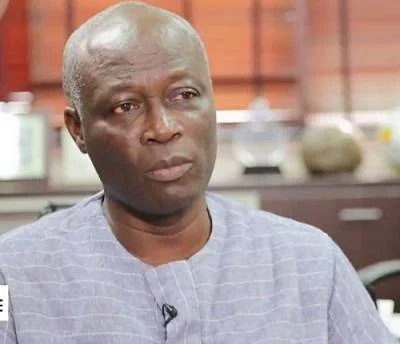By Leo Nelson
The National Coordinator for the District Roads Improvement Programme (DRIP), Edwin Nii Lante Vanderpuye, has admitted that President John Dramani Mahama’s recent remarks on illegal mining, or galamsey, did not please many Ghanaians.
The admission followed the President’s September 10, 2025, media encounter, during which he was pressed on whether he would declare a state of emergency over the environmental devastation caused by the activity. According to Vanderpuye, public expectation was that the President would announce a more forceful measure.
“The only response that people were not too happy with was the president’s on galamsey. I think people came there expecting that he would accept and declare a state of emergency. But listening to various media houses and people’s reactions, it appears that is the one response many were not too happy about.”
Despite the public disappointment, Vanderpuye defended the President’s position as carefully considered. He stressed that President Mahama had not ruled out a state of emergency but believed all opportunities, including legal options available to the state must first be exhausted.
“I think that he handled it intelligently. Indeed, we haven’t exhausted them yet – we still have many avenues to use,” Vanderpuye explained.
The DRIP Coordinator emphasised that solving the galamsey crisis should be seen as a long-term process rather than a one-off announcement. He pointed to existing interventions such as the Blue Water Guards, insisting that these reflect a broader strategy even if they have not yet produced the desired results.
For Vanderpuye the public should reserve its displeasure for when all these interventions still being explored fail completely. “There is a plan – except that the plans in place have not yet yielded the results people are expecting,” he said.
A Threat to National Survival:
Vanderpuye shared personal experiences as a citizen and in his capacity as DRIP Coordinator to illustrate the severity of the problem. During a recent trip to the Western Region, he was alarmed by the extent of water pollution.
“When I checked into a hotel in Takoradi, I stayed on the fourth floor to catch a glimpse of the ocean. Along that corridor, the ocean, as I saw it, was brown. That is how serious it is, and this is even further away from where River Ankobra is.”
He also spoke emotionally about the human toll of the crisis, recalling the deaths of eight colleagues, including five close associates. “I sit here as a Ghanaian – and the only thing I can say is that this is not a matter of gold, but a matter of survival,” Vanderpuye said.
Calling for urgent and decisive action, he warned that extraordinary measures might be required. Despite maintaining his position that the President was “frank” in his response to the menace, he insisted that the country must be prepared to do “whatever it takes to end galamsey,” soon, given where it’s headed.
Applause for Presidential Accountability:
Beyond the galamsey debate, Vanderpuye praised Mahama’s overall handling of the media engagement. He described the session as fair, transparent, and inclusive, and commended the President’s willingness to respond directly to questions from journalists and the public.
“The President was in touch and on top of his job,” Vanderpuye noted, while adding that the inclusion of a planted question on corruption might have strengthened the dialogue.
Looking ahead, he urged that more of such encounters be held regularly to ensure accountability and public engagement. “We need more of this!” he declared, suggesting that January 7, Constitution Day, would be an ideal occasion for another presidential media engagement to assess the government’s progress.
By balancing his defence of the President’s cautious approach with his own urgent call to action, Vanderpuye captured the national dilemma: the need for immediate relief from galamsey’s devastation alongside the importance of strategic, sustainable solutions.


